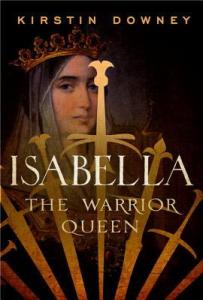I’ve been spending a lot of time in Spain recently! There were two biographies of Isabella of Castile on my book shelf and I’ve now completed reading both of them. My interest in Isabella is a result of my lifelong love of Tudor history and the fact that Isabella was the mother of Catherine of Aragon. I tackled Peggy Liss’ biography first which was very interesting. Downey’s book is also a worthy read.
Downey explains in her afterword that she has a lifelong fascination in the life of Isabella. When she was a young girl living in the American-controlled Panama Canal Zone, she was captivated by the ruins of Spanish buildings which have existed since the voyages of Christopher Columbus. Panama was a trade hub for the shipping of the treasures from the New World to Spain and beyond.
While Liss’ biography is an academic work with exceptional detail, Downey has a different, but still relevant approach to Isabella’s life. She writes about the life events of the Queen, sometimes giving a keen insight into her life and at other times giving an overall picture. There is a little more detail in Downey’s book about Christopher Columbus and his voyages and their impact on Spain as well as the entire world.
Downey covers some new material here as well. She describes the cannibalism the Europeans discovered in the Caribbean and tells us about the possible origin of the sexually transmitted disease of syphilis coming from the New World. She also believes, based on her own journalistic work, that there was a history of sexual abuse in Isabella’s family.
There is some good information about Isabella’s children, especially Prince Juan and her daughter Juana. I particularly enjoyed the details of the life of Juana. Personally, I go back and forth on whether Juana was actually mentally ill or a victim of the men around her. Downey makes the case that Juana was perfectly sane but was unprepared and untrained in how to rule. Juana just wasn’t up to the task. There are some great descriptions about how Juana’s husband, the Archduke Philip, basically abused Juana as well as accounts of how her father plotted to take the throne of Castile from her. This is some really intriguing information and I may have to look into the biographies of Juana listed in the bibliography.
Isabella was an accomplished administrator and a warrior. There are many things to admire about her. But there is also a dark side to her personality. Even taking into account the mindset of medieval and Renaissance Spain, Isabella’s personality is full of religious fervor and rigidity. This leads to some objectionable events during her reign such as the mistreatment and exile of Jews and Muslims as well as the evils of the Spanish Inquisition. Downey argues the Inquisition was mostly the brainchild of Isabella’s husband Ferdinand and he used it for his own purposes for political gains and to increase his personal wealth.
I don’t want to get into a comparison between Downey’s and Liss’ work as both books have their own merits. I will say that Downey’s work is an easier and more enjoyable read and I highly recommend it. Reading both books gives a complete historical rendering of the life of this extraordinary Queen.



The received view that the Spanish Inquisition was created during the reign of Isabella and Ferdinand errs due to a lack of appreciation of the preceding historical context. According to North African Muslim writers, the Moors devised the Spanish Inquisition in order to deal with free-thinkers who flourished during a period when Christians from northern Spain were beginning to make major inroads. The Caliphate’s ministers, refusing to accept any responsibility, quickly looked for someone else to blame. There is nothing like fear to bring out the worst in people.
LikeLiked by 1 person
Do you have a source for this (a bio to recommend)? It would be really helpful in my historical research.
LikeLike
Charity: Please check out the biography mentioned in the review by Bethany Aram. Both her book and Sister Queens have bibliographies in the back for more information on Juana.
LikeLiked by 1 person
Thank you. 🙂
LikeLiked by 1 person
I don’t recall my first source, but if you search for Almoravid and Almohad you will find material on the growth of intolerance in moorish ruled Spain from the early 11th century onward.
LikeLiked by 1 person
Thank you.
I’ve just never heard that before, the Inquisition is often blamed on Isabella and Ferdinand, but if they merely acquired it from the Moors and reconned it into a new purpose, that’s an interesting twist.
LikeLike
Thanks for this review, Susan. I also have a vested interest in Isabella. She’s an ancestor on my father’s maternal side. He found this out more than 20 years ago, when he first began conducting genealogical research. It was an unexpected, yet pleasing surprise.
It’s interesting that Isabella would be deemed a “warrior queen.” Not long after Spanish explorers began arriving in the Western Hemisphere (what is now México and the Caribbean), Isabella learned they were fighting with the indigenous peoples. Isabella ordered them to stop and try to convert them to Christianity. That’s one reason why most people in Latin America are of mixed Caucasian and Indian extraction.
Sadly, the same cannot be said of European expansion in North America. English and French explorers had no interest in working with the Native Americans. They merely saw them as animals to be destroyed.
LikeLiked by 1 person
Reblogged this on History's Untold Treasures and commented:
The Freelance History Writer Notes and Reviews
LikeLike
Pingback: Book Review: “Juana the Mad: Sovereignty & Dynasty in Renaissance Europe” by Bethany Aram | The Freelance History Writer Notes and Reviews
Pingback: Book Review: “Isabella of Castile: Europe’s First Great Queen” by Giles Tremlett | The Freelance History Writer Notes and Reviews